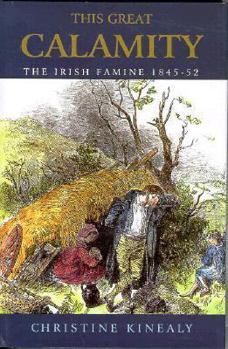This Great Calamity: The Irish Famine, 1845-1852
Select Format
Select Condition 
Book Overview
The Great Famine of 1845-52 was the most decisive event in the history of modern Ireland. In a country of eight million people, the Famine caused the death of approximately one million, while a... This description may be from another edition of this product.
Format:Hardcover
Language:English
ISBN:1570980349
ISBN13:9781570980343
Release Date:January 1995
Publisher:Roberts Rinehart Publishers
Length:450 Pages
Weight:1.94 lbs.
Dimensions:1.4" x 6.3" x 9.3"
Customer Reviews
2 ratings
Deafening Silence
Published by Thriftbooks.com User , 23 years ago
I came to Christine Kinealy's book with a need to understand the historical facts of the famine years. This work, clearly and without bias, sets out the events and provides considered commentary on the role and motivations of the principal participants be they individuals or goverment. I, unlike Chris Fogarty, have no crude or simplistic agenda.Born in Liverpool, of an Irish father and Liverpool/Irish mother who is descended entirely from survivers of the famine; my interest was to try to fill the shocking void this trauma left in my own city's folk memory as evidenced by the singular lack of stories in my family about those years. I did not need another emotional polemic. I wanted, and found, an accurate well researched book.Presented with sensitivity, scrupulous attention to detail, and clearly informed by a determination to get to the historical bedrock ,it reveals this tragedy for what it was, and as for Kinealy being an apologist for the role of the British Establishment, read her concluding pragraph. She understands why the British government and its agents acted as they did but in measured tones damns their actions and exposes their self serving motives. After reading this book I understood better what had happened to the parents,wives, children and husbands of many of my forebearers who married in the late 1840's and 1850,s and registered their status as widow or widower. I also understood better why it happened and why Ireland must never again find herself in a position where the destiny of her people is beyond her sovereign control.
An Academic Defense
Published by Thriftbooks.com User , 23 years ago
As a student of Irish history, and a person of strong nationalist sentiment, I feel somewhat obliged to come to the defense of a valuable historical work that is being ruthlessly slandered. "This Great Calamity," while certainly not alone in the now-expanding field of research Irish Famine, accomplishes its objectives with clarity, scholarship, and an attention to often dismissed or unrecognized primary source material that is truly admirable. There is no history of Ireland, whether by accident or intent, that is not in some way political. This is a simple truth of the field. Within the nationalist sensibility, Chris Fogarty's attention to Britain's role in the mass starvation of the Irish people is to be admired. However, his ill-mannered, poorly-cited, and quite hysterical reviews of several of Christine Kinealy's fine works undermine the very thrust of modern nationalism. As any Irish man or woman might tell you, for too many years the Famine has barely been discussed in Ireland. The pain, the shame, and the widespread loss left a noticeable hole in the scholastic world that has, if only by the grace of Ireland's growing economic prominence and the endevours of historian's such as Kinealy, begun to close. To find the truth of these dark, sad years we must, as a culture that values its past, put aside certain issues and embrace any delving, no matter its angle, into the depths of this period. The historical community aside, Christine Kinealy's work more than earns its place in the library of any open-minded Irish enthusiast or activist. Any Irishmen can tell you the tale as presented by the greats such as Cecil Woodham-Smith, or the epic works of Seamus MacManus, but in the work of Christine Kinealy, the reader is presented with a modern telling of the facts in simple and efficient academic prose. Her facts are correct, her wording unobtrusive (a skill I admittedly lack), and her approach respectfully subjective. She has involved herself in this material, in the lives of these people, both past and present, and she never for a moment shirks her responsibilty when it comes to the implication of wrong, and the attempts to make right, on both sides of the Irish Sea. "This Great Calamity," is as honest, neutral, and academically fulfilling examinations of the Irish Hunger, as one is likely to find anywhere. As a nationalist, I make history my own, ever-recalling and teaching the lesser remembered and often covered-up stories of the Irish past and its less than equal relationship with Britain. However, as a historian I must recognize facts for what they are and celebrate both this work, and its author, for an insightful and well-researched presentation of the darkest days of Irish history.






